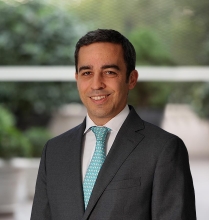Up for debate: the role of green public procurement in mobilizing efforts towards more sustainable development
Garrigues partners Juan Manuel Cabeza and Javier Fernández Rivaya together with Rafael Domínguez Olivera, chief government lawyer in the Ministry of Transport, Mobility and Urban Agenda, examine in the Garrigues Sustainable Dialogs series the course taken by green public procurement in Spain.
Public procurement governed by green and sustainable selection criteria or conditions increased by 176.8% in Spain between 2018 and 2020, according to the quarterly report on public procurement in Spain in 2018, 2019 and 2020. In 2020 this type of public procurement accounted for almost 21% of the aggregate harmonized procurement in Spain. In other words, green procurement, meaning the process by which public sector entities acquire goods, works and services with a reduced environmental impact over their life cycles, is increasingly gaining force.
As part of the Garrigues Sustainable Dialogs, a series of webinars set up to allow Garrigues professionals and experts in a range of subjects to exchange views on relevant topics related to sustainability and ESG criteria, Garrigues partner Javier Fernández Rivaya looked back on the Spanish legislation that has appeared since the Green Public Procurement Plan by the central government administration and the Code of Environmental Good Practices for Maintenance Agreements and Minor Works, both adopted in 2008, “which posed interesting objectives at that early stage”. The approval of the currently in force 2017 Public Sector Contracts Law was the point when it was determined that environmental concerns and sustainability generally should condition how public procurement is conceived. “The spirit present in all these pieces of legislation was later renewed in the currently in force Green Public Procurement Plan by the central government administration, the related autonomous community agencies and the public social security institutes, which were even more ambitious in their targets, by seeking to encourage the obtaining of goods, works or services with the lowest possible environmental impact, to achieve smart, sustainable and integrated growth, and to serve as a tool for achieving the aims of the Spanish Circular Economy Strategy”, among other things. “In short, public procurement is called upon to play a very important role in mobilizing efforts towards increasing sustainable and social development in economic activity, as was recognized in the General Guidelines for the Sustainable Development Strategy 2030”, affirmed Fernández Rivaya.
Rafael Domínguez Olivera, chief government lawyer in the Ministry of Transport, Mobility and Urban Agenda, affirmed that the climate change law, approved only a year ago, strengthened “the process for a change of approach to public procurement that is currently happening”. He believes that it is necessary to continue on this path, “we must not lose sight of the reference point that procurement is done on the market and that it is important to strike a balance to achieve the greatest degree of efficiency”. This means that instead of prohibiting certain steps, the law creates the conditions for the market to operate with a certain amount of freedom while the public sector serves as an example, which gave an important boost to green public procurement. He considers, to the contrary, that the fact that determinations on public procurement are scattered in different pieces of legislation may pose a difficulty for applying them in practice.
Garrigues partner Juan Manuel Cabeza confirmed that important steps are being taken in this direction at the autonomous community and local levels of government. He mentioned the cases of Madrid, with its Air Quality and Climate Change Plan and its Environmental Sustainability Strategy Madrid 360, and Barcelona, which “has introduced environmental clauses of this type in its regulations and contracts in an increasingly binding and expansive way”.
In relation to the list of products and services that need to be procured in line with standards related to combating climate change, which the law entrusted to the green transition and finance ministries, Domínguez noted that the time period for their approval ends on May 22 and that there will be a “shift in perspective”, because the technical specifications will be required in all public tender processes.
Lastly, the speakers discussed the weight that environmental criteria will have in contracts that will be funded out of the Recovery, Transformation and Resilience Plan. “The environmental element is a determining factor in the allocation of European funds, because they have to be in line with the principle that no environmental damage may be caused”, said Domínguez. He added that “The environmental element must be present at every stage of the procurement and allocation process, because the very funding of the project is at stake”.
Contacts


